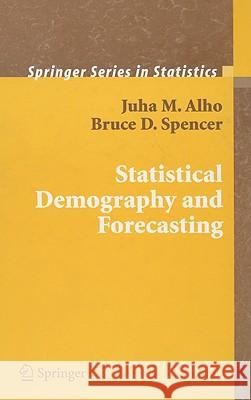Statistical Demography and Forecasting » książka
Statistical Demography and Forecasting
ISBN-13: 9780387235301 / Angielski / Twarda / 2005 / 412 str.
Sustainability of pension systems, intergeneration fiscal equity under population aging, and accounting for health care benefits for future retirees are examples of problems that cannot be solved without understanding the nature of population forecasts and their uncertainty. Similarly, the accuracy of population estimates directly affects both the distributions of formula-based government allocations to sub-national units and the apportionment of political representation. The book develops the statistical foundation for addressing such issues. Areas covered include classical mathematical demography, event history methods, multi-state methods, stochastic population forecasting, sampling and census coverage, and decision theory. The methods are illustrated with empirical applications from Europe and the U.S. For statisticians the book provides a unique introduction to demographic problems in a familiar language. For demographers, actuaries, epidemiologists, and professionals in related fields, the book presents a unified statistical outlook on both classical methods of demography and recent developments. To facilitate its classroom use, exercises are included. Over half of the book is readily accessible to undergraduates, but more maturity may be required to benefit fully from the complete text. Knowledge of differential and integral calculus, matrix algebra, basic probability theory, and regression analysis is assumed. Juha M. Alho is Professor of Statistics, University of Joensuu, Finland, and Bruce D. Spencer is Professor of Statistics and Faculty Fellow at the Institute for Policy Research, Northwestern University. Both have contributed extensively to statistical demography and served in advisory roles and as statistical consultants in the field.











